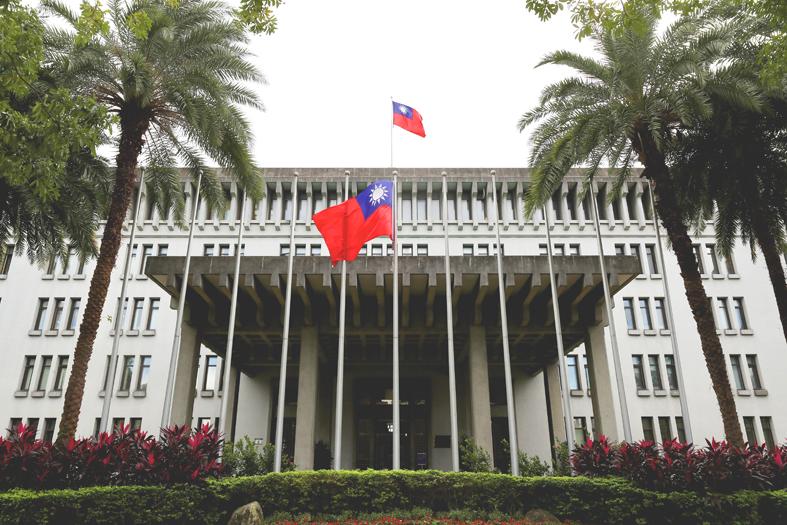Members of the Formosa Club, a group of Taiwan-friendly lawmakers in Europe, on Thursday expressed concern over China’s attempts to disrupt supply chain links to European firms, and reiterated support for Lithuania, which has been targeted by Beijing.
In a letter to European Council President Charles Michel and European Commission President Ursula von der Leyen, they said: “Since Taiwan opened its representative office in Vilnius on November 18, China has resorted to every possible means to coerce Lithuania in an increasingly unscrupulous and brazen fashion.”
“This campaign has included everything from removing Lithuania from China’s customs clearance list to unilaterally renaming the Lithuanian Embassy in China and recalling all ID cards of its personnel,” said the letter, which the group shared on Twitter.

Photo: RITCHIE B. TONGO, EPA-EFE
“While China’s threats are increasingly becoming a reality, it is also becoming crystal clear that the target of China’s coercive action is not simply Lithuania, but more broadly, the fundamental integrity of European supply chains,” it said.
A dozen German companies, including vehicle parts giant Continental AG, have faced significant pressure to stop using components made in the Baltic country, with Beijing threatening to shut them out of the Chinese market, the letter said.
“As the EU is making all the effort to achieve strategic autonomy, China’s economic sanction against Lithuania is a litmus test to [the] EU’s determination and solidarity,” the letter said, calling on the EU to take action to resist such coercion.
“The last thing that we would like to see is the EU and member states being blamed for inaction in the face of this coercion,” it said.
In Taipei, the Ministry of Foreign Affairs said that the letter was signed by members of the European Parliament and 24 national parliaments, including European Parliament-Taiwan Friendship Group chairman Michael Gahler, Germany-Taiwan Parliamentary Friendship Group chairman Klaus-Peter Wilsch and Lithuanian Parliamentary Group for Relations with the Republic of China (Taiwan) chairman Matas Maldeikis.
The ministry thanked the lawmakers for their support.
Their move shows that there is a consensus among European countries to resist China’s increasingly arbitrary coercions against democratic countries, the ministry said in a news release.
Taiwan, as a like-minded and friendly partner of Lithuania, would continue to deepen its bilateral trade relations, it said, calling on like-minded countries to join efforts to defend a rules-based international trade order.

The US government has signed defense cooperation agreements with Japan and the Philippines to boost the deterrence capabilities of countries in the first island chain, a report by the National Security Bureau (NSB) showed. The main countries on the first island chain include the two nations and Taiwan. The bureau is to present the report at a meeting of the legislature’s Foreign Affairs and National Defense Committee tomorrow. The US military has deployed Typhon missile systems to Japan’s Yamaguchi Prefecture and Zambales province in the Philippines during their joint military exercises. It has also installed NMESIS anti-ship systems in Japan’s Okinawa

‘WIN-WIN’: The Philippines, and central and eastern European countries are important potential drone cooperation partners, Minister of Foreign Affairs Lin Chia-lung said Minister of Foreign Affairs Lin Chia-lung (林佳龍) in an interview published yesterday confirmed that there are joint ventures between Taiwan and Poland in the drone industry. Lin made the remark in an exclusive interview with the Chinese-language Liberty Times (the Taipei Times’ sister paper). The government-backed Taiwan Excellence Drone International Business Opportunities Alliance and the Polish Chamber of Unmanned Systems on Wednesday last week signed a memorandum of understanding in Poland to develop a “non-China” supply chain for drones and work together on key technologies. Asked if Taiwan prioritized Poland among central and eastern European countries in drone collaboration, Lin

BACK TO WORK? Prosecutors said they are considering filing an appeal, while the Hsinchu City Government said it has applied for Ann Kao’s reinstatement as mayor The High Court yesterday found suspended Hsinchu mayor Ann Kao (高虹安) not guilty of embezzling assistant fees, reducing her sentence to six months in prison commutable to a fine from seven years and four months. The verdict acquitted Kao of the corruption charge, but found her guilty of causing a public official to commit document forgery. The High Prosecutors’ Office said it is reviewing the ruling and considering whether to file an appeal. The Taipei District Court in July last year sentenced Kao to seven years and four months in prison, along with a four-year deprivation of civil rights, for contravening the Anti-Corruption

NO CONFIDENCE MOTION? The premier said that being toppled by the legislature for defending the Constitution would be a democratic badge of honor for him Premier Cho Jung-tai (卓榮泰) yesterday announced that the Cabinet would not countersign the amendments to the local revenue-sharing law passed by the Legislative Yuan last month. Cho said the decision not to countersign the amendments to the Act Governing the Allocation of Government Revenues and Expenditures (財政收支劃分法) was made in accordance with the Constitution. “The decision aims to safeguard our Constitution,” he said. The Constitution stipulates the president shall, in accordance with law, promulgate laws and issue mandates with the countersignature of the head of the Executive Yuan, or with the countersignatures of both the head of the Executive Yuan and ministers or